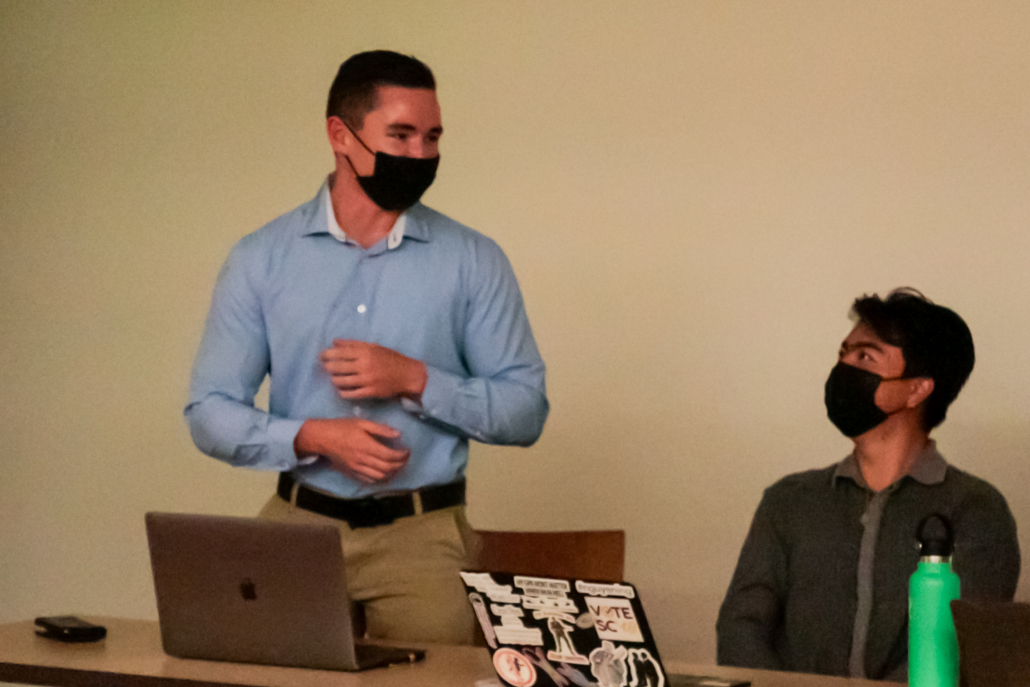USG discusses expanding gym hours, accessibility

On Tuesday, members of the Undergraduate Student Government discussed plans to help expand hours at the Lyon Center, provided an update on upcoming diversity training, and announced Holly McCauley, a graduate student studying literary editing and publishing, as the nominee for Chair of the Legislative Branch Accessibility Affairs Committee.
McCauley, co-executive director for the Student Assembly for Accessibility and former member of the Diversity, Equity and Inclusion Council and the USG Accessibility Committee, said she’d “always been involved in disability community activism,” but that she truly discovered her passion for academic accessibility when she sustained hearing loss at 16 years old and began experiencing educational barriers firsthand.
When she first arrived at USC, McCauley said it was especially difficult to adjust as a student with a physical disability because professors and administrators didn’t “have the time or capacity to check in one-on-one with students.”
To McCauley, on-campus student-run organizations such as USG and SAA are the ideal places to “amplify the voices of those disabled students that aren’t getting heard anywhere else.”
On Sept. 28, the Senate will vote on McCauley’s confirmation. If she’s appointed as chair, McCauley will become responsible for overseeing the Accessibility Affair Committee’s projects for the rest of the year.
One of USG’s upcoming projects, designed to raise awareness for disability rights, is an “accessibility scavenger hunt” taking place on Nov. 5. USG Vice President Lucy Warren said the scavenger hunt’s goal is to identify structures on campus that are non-compliant with the Americans with Disabilities Act. Warren also hopes the event will further highlight the need for an on-campus “disability cultural center.”
Warren said she has dealt with “several chronic illnesses” herself and knows what it’s like to face added challenges.
“[I] have varying accessibility needs that change day-to-day,” Warren said. “I have spent years battling dropping out of school because our school just doesn’t provide [the necessary] resources.”
In addition to advocating for the disability cultural center, Warren said she’s been meeting with Provost Charles Zukoski to “create universal infrastructure” for students to access recordings for every class that’s offered at USC — both during and after the pandemic. At the moment, Warren and Zukoski are working to send out a “campus-wide survey of students’ experiences” to gauge how many people might benefit from such a program.
During the meeting, Chief Diversity Officer Kavita Rai presented an update on the accessibility scavenger hunt, advocacy liaison training and an upcoming USG-wide implicit bias workshop.
Sen. Brian Stowe gave the second and final presentation of the night, in which he recounted his time spent meeting with USC Recreational Sports, alongside Sen. Russell Augustin, in the hopes of expanding gym hours at both the Village and Lyon fitness centers.
In an interview with the Daily Trojan, Stowe described expanding access to the fitness centers as his “top priority.” According to Stowe, he initially wanted to meet with the leadership from RecSports to figure out why the hours at the gyms were “so limited.”
“In terms of expanding the hours, [RecSports has] 100 student workers. The gym is mostly run by students on work study programs or just applying for jobs. They’re really short-staffed … due to COVID happening, wiping out the whole student workforce,” Stowe said. “To rehire everyone, I was trying to give them some advice on how to expedite that process. They basically just need to have students set up on work days so they can get paid, and that’s really not a difficult process, the way they’re going about it is not efficient.”
Stowe said he thinks RecSports should stop trying to schedule in-person appointments with each individual applicant and instead set up a mass Zoom call for people to “shuffle through” and show their passports on camera in order to verify they’re authorized to work.
“I know a lot of that right now is just frustration and anger, because no one knows what’s going on,” Stowe said. “But there’s reasons behind that, so we can just communicate the reasoning, and it will eventually return. That’s the next step.”
Additionally, Sens. Diego Andrades and Devin Nyala, who both faced challenges as appeal students, are working to organize a virtual orientation and create new resources for students undergoing similar circumstances.
“We applied to USC and didn’t get in, and then instead of waiting to transfer, we actually appealed our rejection, and then got in,” Andrades said. “I came to this school, and … there was always a part of me that felt like I didn’t belong, and that I didn’t deserve the appeal. That I just got lucky on a whim. Since then, I’ve done a lot, and I’ve realized that wasn’t the case … but I was really affected by my status as an appeal student.”
Nyala said being an appeal student is an “unconventional way” to enroll at USC.
“You really get pushed into it later than most people, even transfer students,” Nyala said. “By that time, everyone already has their roommates and everyone is just already making friends, so I think it was kind of difficult to really engage myself in the USC community.”

